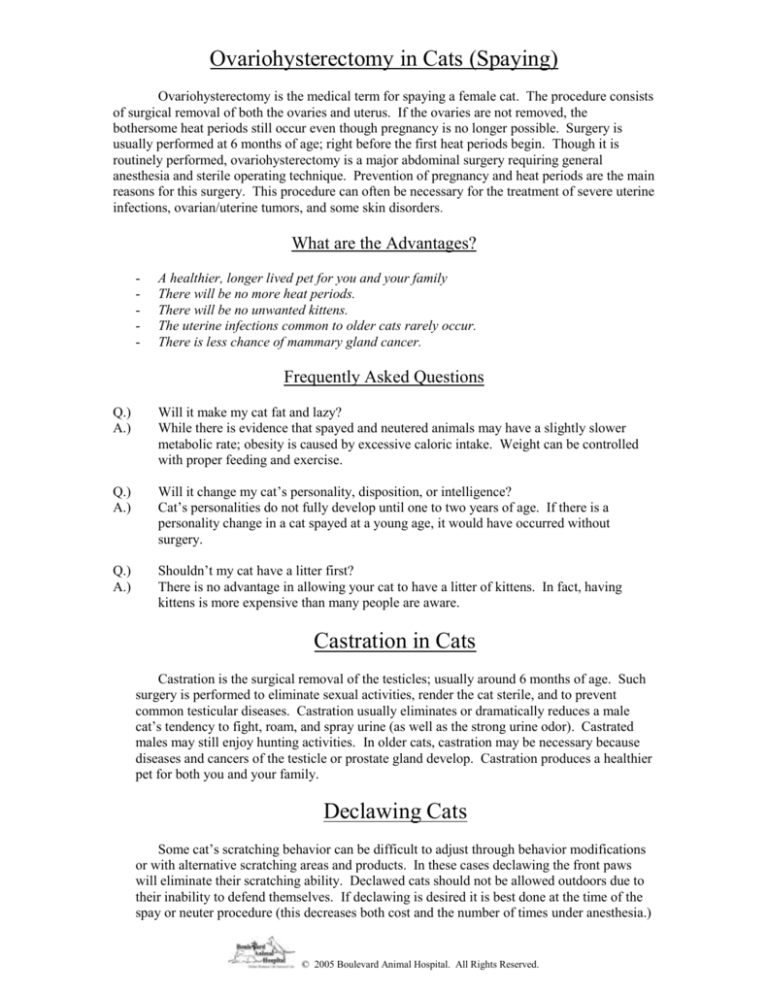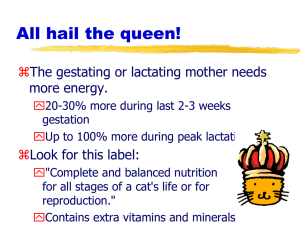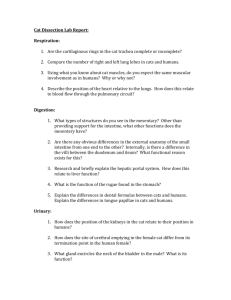
Ovariohysterectomy in Cats (Spaying)
Ovariohysterectomy is the medical term for spaying a female cat. The procedure consists
of surgical removal of both the ovaries and uterus. If the ovaries are not removed, the
bothersome heat periods still occur even though pregnancy is no longer possible. Surgery is
usually performed at 6 months of age; right before the first heat periods begin. Though it is
routinely performed, ovariohysterectomy is a major abdominal surgery requiring general
anesthesia and sterile operating technique. Prevention of pregnancy and heat periods are the main
reasons for this surgery. This procedure can often be necessary for the treatment of severe uterine
infections, ovarian/uterine tumors, and some skin disorders.
What are the Advantages?
-
A healthier, longer lived pet for you and your family
There will be no more heat periods.
There will be no unwanted kittens.
The uterine infections common to older cats rarely occur.
There is less chance of mammary gland cancer.
Frequently Asked Questions
Q.)
A.)
Will it make my cat fat and lazy?
While there is evidence that spayed and neutered animals may have a slightly slower
metabolic rate; obesity is caused by excessive caloric intake. Weight can be controlled
with proper feeding and exercise.
Q.)
A.)
Will it change my cat’s personality, disposition, or intelligence?
Cat’s personalities do not fully develop until one to two years of age. If there is a
personality change in a cat spayed at a young age, it would have occurred without
surgery.
Q.)
A.)
Shouldn’t my cat have a litter first?
There is no advantage in allowing your cat to have a litter of kittens. In fact, having
kittens is more expensive than many people are aware.
Castration in Cats
Castration is the surgical removal of the testicles; usually around 6 months of age. Such
surgery is performed to eliminate sexual activities, render the cat sterile, and to prevent
common testicular diseases. Castration usually eliminates or dramatically reduces a male
cat’s tendency to fight, roam, and spray urine (as well as the strong urine odor). Castrated
males may still enjoy hunting activities. In older cats, castration may be necessary because
diseases and cancers of the testicle or prostate gland develop. Castration produces a healthier
pet for both you and your family.
Declawing Cats
Some cat’s scratching behavior can be difficult to adjust through behavior modifications
or with alternative scratching areas and products. In these cases declawing the front paws
will eliminate their scratching ability. Declawed cats should not be allowed outdoors due to
their inability to defend themselves. If declawing is desired it is best done at the time of the
spay or neuter procedure (this decreases both cost and the number of times under anesthesia.)
© 2005 Boulevard Animal Hospital. All Rights Reserved.












